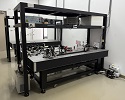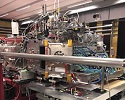Organic semiconductor laboratory
The Organic Semiconductor Laboratory of Hsin-Fei Meng is focused on conjugated polymers-based physics as well as semiconductor devices. Conjugated polymers are a kind of organic semiconductors consisting of carbon chains. Because of their unique physical properties, they are regarded as promising new materials for producing LED, laser, transistor and electro-optical devices.
Quantum matter physics laboratory
In the Quantum Matter Physics Laboratory of Jiunn-Yuan Lin, the discovery of new materials and the creation of new building blocks of high-Tc superconductivity, together with the topological insulators and superconductors, are the core areas of activity. For years, this lab has made significant contributions with respect to order parameter symmetry and the superconductivity mechanism of novel superconductors, such as MgB2, MgCNi, NaxCoO2 and FeSe. Studies on the magnetism in thin films of manganese oxides and cuprates have also been conducted.
Cosmic rays laboratory
The research of G.-L. Lin and his group focuses on dark matter (DM) phenomenology and reactor neutrino experiment. In the area of reactor neutrino experiment, Lin and his group members joined the Daya Bay reactor neutrino experiment in 2006. Currently the NCTU group continues the ongoing effort to help provide Daya Bay’s physics analysis. Furthermore this group also joins the newly established JUNO collaboration, which is situated in Southern China and aims at uncovering neutrino mass ordering.
Lattice Field Theory Group
Members in C.-J. David Lin’s Lattice Field Theory group have been working on non-perturbative features in quantum field theory. In particular, they focus on computations in theories that will have impact on physics at the Large Hadron Collider. These include QCD hadronic matrix elements, the study of the Higgs potential in the presence of new physics beyond the Standard Model, the scaling properties of the Yukawa coupling, and the search for infrared fixed points in exotic gauge theories coupled to fermions.
Laser and Photonics Laboratory
The main goal is the research of nonlinear optics and lasers, and focuses on exploring and creating novel structured light fields. In addition, the core research covers areas such as quantum and photonic technology, semiconductor lasers, laser physics and optoelectronics, and is committed to the in-depth development of application and theory.
Spectroscopy of Novel Materials Laboratory
The main research goal is to probe and control the electronic behavior, namely the electronic ground states and various elementary excitations out of fundamental degrees of freedom (i.e. spin, charge, orbital, lattice).







